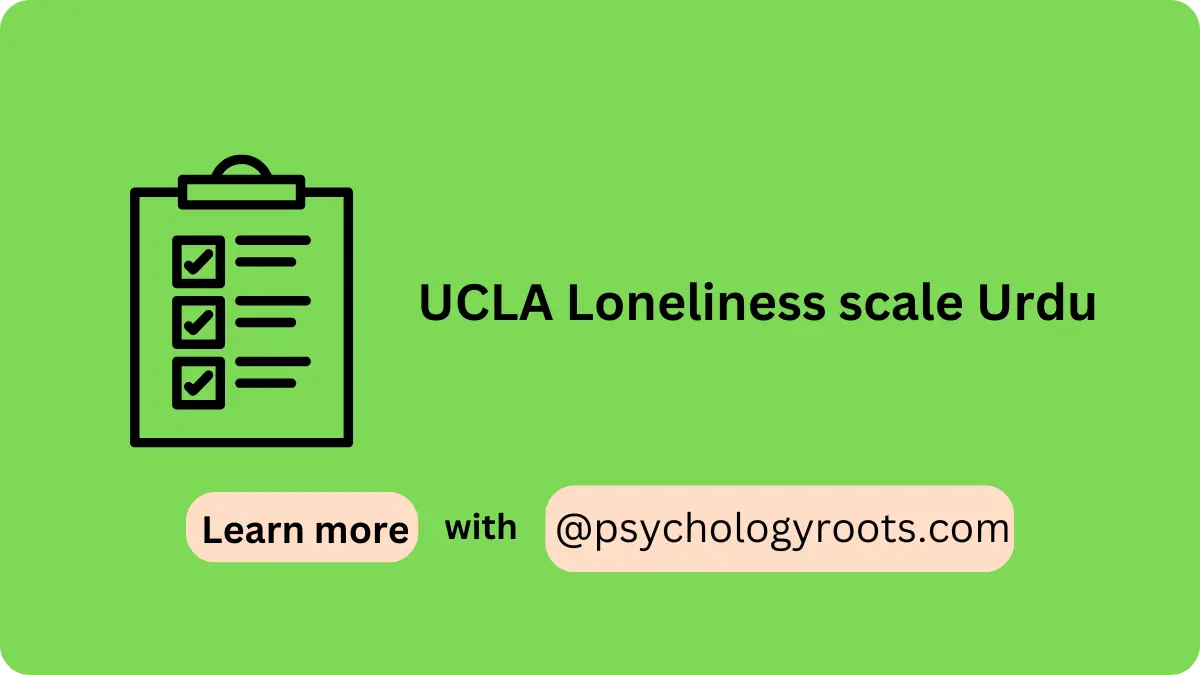Table of Contents
UCLA Loneliness scale Urdu
Here in this post, we are sharing the “UCLA Loneliness scale Urdu”. You can read psychometric and Author information. We have thousands of Scales and questionnaires in our collection (See Scales and Questionnaires). You can demand us any scale and questionnaires related to psychology through our community, and we will provide you with a short time. Keep visiting Psychology Roots.
About UCLA Loneliness scale Urdu
Scale Name
UCLA Loneliness scale Urdu
Author Details
Dr. Wahida Anjum and Dr. Iffat Batool, Department of Psychology, Government College University Lahore, Pakistan.
Corresponding : wahidaanjum@yahoo.com. Contact number: 03311140848
Translation Availability

Background/Description
The UCLA Loneliness Scale is a widely recognized instrument developed to assess subjective feelings of loneliness and social isolation. Originally created in English, its applicability across diverse linguistic and cultural contexts necessitated translations and validations in various languages. In this regard, Dr. Wahida Anjum and Dr. Iffat Batool undertook the task of translating and validating the UCLA Loneliness Scale for the Urdu-speaking population in Pakistan.
Translation and Validation Process
The translation process adhered to established guidelines to ensure linguistic and conceptual equivalence between the original English version and the Urdu translation. The steps included:
- Forward Translation: The original English items were translated into Urdu by experts proficient in both languages.
- Committee Approach: A panel of bilingual professionals reviewed the translations to resolve discrepancies and ensure cultural relevance.
- Back Translation: The Urdu version was translated back into English by independent translators unfamiliar with the original scale to check for consistency.
- Pilot Testing: The preliminary Urdu version was administered to a sample to identify any ambiguities or issues.
- Psychometric Evaluation: The finalized Urdu version underwent rigorous testing to establish its reliability and validity within the Pakistani cultural context.
Administration, Scoring and Interpretation
- Obtain a Copy: The Urdu version of the UCLA Loneliness Scale can be accessed through the publication by Anjum and Batool (2016).
- Explain the Purpose: Inform participants that the scale measures their subjective feelings of loneliness and social isolation.
- Provide Instructions: Participants should respond to each item based on their recent experiences, selecting the option that best reflects their feelings.
- Approximate Time: Completing the scale typically takes about 10 minutes.
- Administer the Scale: Ensure a quiet environment free from distractions to facilitate accurate responses.
Reliability and Validity
The Urdu version of the UCLA Loneliness Scale has demonstrated high internal consistency, with a Cronbach’s alpha coefficient of 0.85. Factor analysis revealed a one-dimensional factor structure consistent with the original scale, confirming its construct validity.
Available Versions
20-Items
Reference
Anjum, W., & Batool, I. (2016). Translation and cross language validation of UCLA Loneliness Scale among adults. Science International, 28(4), 517-521.
Important Link
Scale File:
Frequently Asked Questions
What is the purpose of the Urdu-translated UCLA Loneliness Scale?
The scale aims to assess subjective feelings of loneliness and social isolation among Urdu-speaking individuals, providing a culturally relevant tool for research and clinical assessments.
Who developed the Urdu version of the UCLA Loneliness Scale?
The translation and validation were conducted by Dr. Wahida Anjum and Dr. Iffat Batool from the Department of Psychology at Government College University Lahore, Pakistan.
How can I access the Urdu version of the UCLA Loneliness Scale?
The scale is available on ResearchGate: Urdu UCLA Loneliness Scale by Wahida Anjum.
Is the Urdu version of the UCLA Loneliness Scale reliable and valid?
Yes, the Urdu version has demonstrated high reliability and validity, making it a suitable tool for assessing loneliness in the Pakistani cultural context.
Can I use the Urdu version of the UCLA Loneliness Scale for my research?
Yes, researchers are permitted to use the Urdu version for research purposes. It is recommended to cite the original validation study by Anjum and Batool (2016) in any publications.
Disclaimer
Please note that Psychology Roots does not have the right to grant permission for the use of any psychological scales or assessments listed on its website. To use any scale or assessment, you must obtain permission directly from the author or translator of the tool. Psychology Roots provides information about various tools and their administration procedures, but it is your responsibility to obtain proper permissions before using any scale or assessment. If you need further information about an author’s contact details, please submit a query to the Psychology Roots team.
Help Us Improve This Article
Have you discovered an inaccuracy? We put out great effort to give accurate and scientifically trustworthy information to our readers. Please notify us if you discover any typographical or grammatical errors.
Make a comment. We acknowledge and appreciate your efforts.
Share With Us
If you have any scale or any material related to psychology kindly share it with us at psychologyroots@gmail.com. We help others on behalf of you.